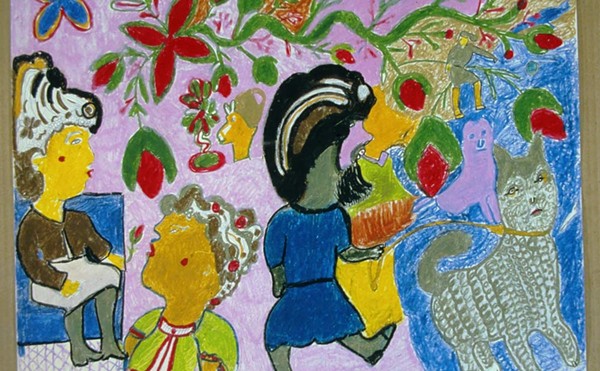While married to his third wife, Anne, author Philip K. Dick enjoyed perhaps his most fertile creative period. During the years 1958 to 1964, most of which he spent in Point Reyes, Calif., Dick penned 17 novels, including several of his most celebrated works: The Man in the High Castle, The Three Stigmata of Palmer Eldritch, Martian Time-Slip, Confessions of a Crap Artist and Dr. Bloodmoney. Following the Point Reyes period and his divorce from Anne, Dick's production declined dramatically. From 1964 through the end of his life in 1982, he wrote just 16 novels (two of which were collaborations).
Immediately after his death, Anne R. Dick began the research for Search for Philip K. Dick, 1928-1982, the first Dick biography. It was completed in 1984 and first published in 1995 as a $120 hardback from Edwin Mellen Press (though the manuscript was given to all Dick biographers).
Dick recently revisited the work: She has revised the original text and issued an affordable $17 paperback edition through her own Point Reyes Cypress Press. "It was accidental that I did it at this time. I was waiting and waiting for some poetry to come back from an editor and decided to use my waiting time go through Search and do a small edit. It turned into a major revision." She added new material about her former husband and reorganized the text, making it more readable.
The project itself grew out of a need for answers. "`It` was an attempt to understand what had happened to our relationship at the time of our divorce," she says. "Actually, writing things down turned out to be therapeutic. In words I could go back and feel more in control during those chaotic times."
Dick intended from the very beginning to learn about her ex-husband's life after he left Point Reyes. "As well as being traumatized, I was curious. Then, when I had finished that part of my research, it seemed only logical to learn about his life before he met me."
As explored in Search and later books, Philip Dick famously used aspects of his real life in his surreal and often outlandish stories. "He wrote Confessions of a Crap Artist `one of his earliest and perhaps most successful ‘autobiographical non-science fiction mainstream' works` on our honeymoon! I was stunned and somewhat dismayed, but I didn't say anything except that I thought it was a good book. Privately I thought to myself, ‘I guess this is what writers do.' There were a number of other Point Reyes books in which the principal female character is more or less based on me."
She found the attention flattering, even though her husband often portrayed women negatively. "I liked being Juliana Frink `from Man in the High Castle`. It was fun to watch the good-looking, bitchy French lady in Barjo `the 1992 French film adaptation of Confessions`. Phil didn't paint positive female protagonists until he wrote The Transmigration of Timothy Archer, his last book."
Dick revealed several arguably unflattering aspects of her ex-husband. "Many people know now how eccentric Phil's life was. Many great writers had strange and unsettling lives." She explored several of his positive traits as well. "He always tried to help people throughout his life. His books are full of light. I think most people are different and strange way down in their psyches, and in some people their unusual characteristics are closer to the surface."
Reactions to Philip's life vary depending on the perspective. "I guess it depends on the way you read it," Dick says. "Everyone seems to read it differently. Many famous writers have darker sides than Philip K. Dick. We live in a judgmental society where conformity is subliminally enforced despite our loud claims about individuality. The English, for example, love and cultivate their eccentrics."
"Originally some of his close friends from Orange County were dismayed when they read the manuscript," she remarks about the initial reaction to her search. "Later, other biographers created a similar portrait. Everyone who knew Phil personally got used to it. They all still are very fond of Phil." Viewpoints do, however, tend to vary along gender lines. "The men involved with Phil's career and his personal friends had an entirely different reaction to these books. Mine came out first and no one realized how many different lives Phil had had. Actually, my book was more sympathetic to Phil."
Anne Dick maintains relationships with several other members of the Phil Dick clan. "I get along fine with the ones I know, `like` Nancy `Philip's fourth wife` and Isa `Philip's daughter with Nancy`. I'm not in touch with Kleo `his second wife`, although she did give me a good interview back in the early 1980s when I was writing Search. I don't know Tessa `his fifth wife`. My daughter Laura `with Philip, who manages her father's estate along with Isa` and I get along well, but when we get together we don't talk about the Philip K. Dick estate. I only know what's happening when I read David Gill's blog, The Total Dick-Head
(www.totaldickhead.blogspot.com)."
Dick, who never remarried ("Phil was a hard act to follow"), entertains her own literary aspirations. "Now that I've lived a long life, I have the opportunity to write about everything I've lived and read. I especially love editing, looking for just the right word or phrase, getting rid of everything superfluous. I love learning more about writing and about myself, how my mind works. In my personal universe, the only life worth living is one connected with the arts and literature."
"I'm still being amazed," she comments about Philip's current rock-star literary status. "Although back when I was married to him, I always thought he was going to be recognized as an important writer one day.
"`Phil` believed in his writing and wouldn't have been all that surprised. He would have liked the recognition, but he would have liked getting back to his next novel even better. He loved writing. It was his life."
The essential Philip K. Dick: a beginner's guide
Curious about Philip K. Dick but not sure where to start? Here's a little guidance.
Arguably, Dick produced eight masterpieces: The Man in the High Castle (1962), Martian Time-Slip (1964), The Three Stigmata of Palmer Eldritch (1965), Do Androids Dream of Electric Sheep? (1968), Ubik (1969), Flow My Tears, the Policeman Said (1974), Scanner Darkly (1977) and Valis (1981).
Perhaps most accessible to new readers, especially those unfamiliar with science fiction,The Man in the High Castle relates a complex, alternate-history tale of an occupied America where the Axis won World War II. Dick cleverly incorporates the I Ching into the plot of this rich story.
In The Three Stigmata of Palmer Eldritch and Martian Time-Slip, Dick explores the multi-tiered, corporate-controlled lives of drug-addled, autistic Martian colonists. Electric Sheep, the original tale of Rick Deckard's quest, differs significantly from the cult film Blade Runner, but this classic tale still offers similar themes. Perhaps Dick's finest exploration of the nature of reality, Ubik, an anti-consumerist mystery involving a multinational corporation, centers on the search for Ubik, the elusive substance at the core of all things.
For dark near-future thrillers, check out Flow My Tears, the Policeman Said and Scanner Darkly. Both novels contain rampant drug use coupled with a paranoid distrust of law enforcement. Distraught over the drug-related deaths of so many friends, Dick used Scanner to issue a strong parable about the risks of drug use.
Dick's most critically acclaimed book, Valis, fictionalizes his professed encounters with Valis, a manifestation of God. Neophytes should not start with this nonlinear postmodern novel, among the most difficult of his oeuvre.
All eight novels are currently available individually or in one of three handsome Library of America hardcover omnibuses.
[email protected]
















